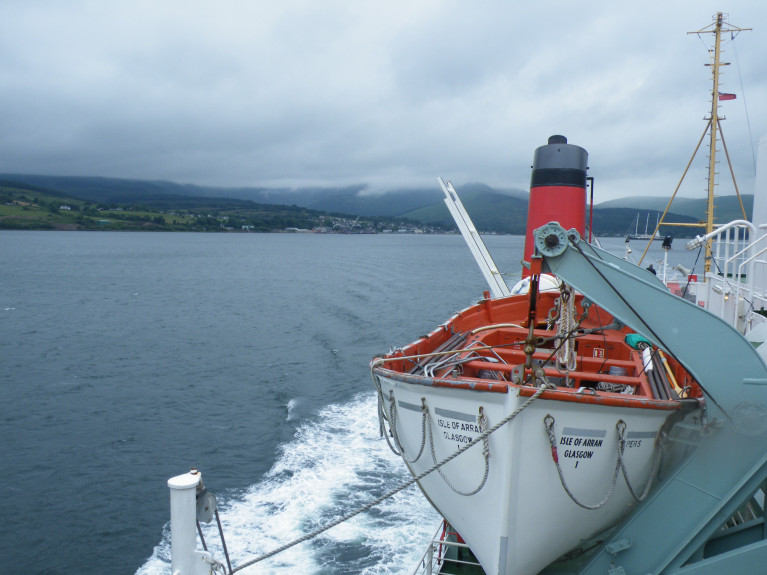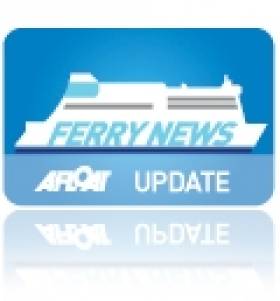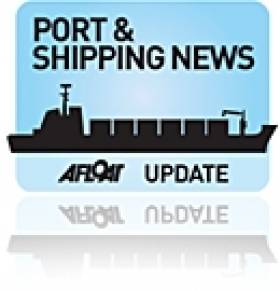Displaying items by tag: Mull of Kintyre
West Scotland ferry operator Caledonian MacBrayne (CalMac) has announced that one of its routes will be cancelled for the rest of the year.
In July, CalMac said its Ardrossan-Campbeltown seasonal service was due to return on 24 August.
In addition CalMac said in June, that its estimated that the (routine Islay serving) MV Hebridean Isles – became a (relief) ferry which sails the Clyde route – should be back in service around 27, July.
However, deadline after deadline has been missed and the Scottish government controlled CalMac has now said that the service will be cancelled for the remainder of the year.
The Ardrossan (Ayrshire)-Campbeltown (Argyll) route only runs in the summer timetable, and the MV Hebridean Isles will not be back in service in time for the end of the season.
CalMac in a statement said: “As a result of vessel deployments, and the ongoing issues with MV Hebridean Isles, this service will unfortunately be cancelled for the remainder of the summer period – we do apologise to our customers and the community for this outcome.
To read more from the statement, Border Telegraph reports and on other ferry operations on the Firth of Clyde and to Islay.
Another route to the Mull of Kintyre peninsula, Afloat adds albeit from Co. Antrim is a fast 'passenger' ferry boat operated by Kintyre Express on a summer service between Ballycastle and Campbeltown.
In addition the operator also serves a seasonal Ballycastle-Islay route through Port Ellen.
Scotland's most southerly domestic ferry route, Ardrossan-Campbeltown (Mull of Kintyre), is to be broken up by a stop on Arran to accommodate travellers to the island on peak days.
The new timetable, which CalMac announced, will see extra journeys from Ardrossan to Brodick on Thursdays and Fridays from June 2 until August 29.
The Campbeltown ferry will depart Ardrossan on Thursdays and Fridays at 4.45pm, stopping off at Brodick en route and will return the following day along the same route at 6.45am on the Friday morning in addition at 7am on the Saturday morning.
More from Ardrossan & Saltcoats Herald.
CalMac’s Summer-Only Mull of Kintyre Service Extended into 2015
#CalMacKintyre – Caledonian MacBrayne's Ardrossan-Campbeltown summer-only service ended in late September, writes Jehan Ashmore.
The Scottish ferry operator originally had a trial pilot-period of two years to assess its viability and this has been extended into a third year with sailings to resume in 2015.
When CalMac launched the service linking Ardrossan (Aryshire) and Campbeltown (Argyll), this was their first new route for almost two decades. The 1 hour 40 minute service is part of a Scottish Government's final Ferries Review that covers ferry operations over a timeframe up to 2022.
Sailings started last May and once again it was the stalwart, Isle of Arann (1984/3,296grt) that carried out crossings enabling more than 600 passengers and 60 plus vehicles to be transported on this scenic route.
The summer service is to reinvigorate tourism in these regions and opening up interesting travel options to explore southern Scotland and where a round trip could include a stopover to Brodick, Isle of Arann dubbed Scotland in miniature. This option is only scheduled on Saturdays and from the direction of Campeltown to Ardrossan.
In addition Isle of Arann boosted capacity on the Ardrossan-Brodrick. The 55-minute service across the Forth of Clyde is operated year-round by Caledonian Isles.
In December a timetable for the 2015 season of the Ardrossan-Campbeltown route is due to released on the CalMac website.
Readers may recall that a trip from Northern Ireland to link in with the Campbeltown-Ardrossan service could be achieved by using Kintyre Express operations from Ballycastle to the port at the southern tip of the Mull of Kintyre.
The high-speed RIB based and 'foot' passenger only service ceased crossings also last month.
New Passenger-Only Ferry for Northern Ireland-Scotland Route
Plans to operate the first passenger-only ferry service between Northern Ireland and Scotland are scheduled to start in late May, writes Jehan Ashmore.
Kintyre Express is to operate a Ballycastle-Campbeltown service on Fridays, Saturdays and Sundays between 27 May and 26 September. Three daily return trips are scheduled on the service though the 1200hrs sailing from Campeltown and the corresponding 1400hrs sailing from Ballycastle will only operate on customer demand.
The passage time is scheduled to take approximately 1 hour 30 minutes between County Antrim and the Mull of Kintyre which is a distance of some 50 kilometres / 30-miles. Ticket fares for a single journey are £30 and the return is £55. On the remaining days that the route is not operated on, the boat is available for private charter.
In addition the new venture is to include an on-demand Campbeltown-Troon route running between April and September. This second service, linking Argyll with Ayrshire, will operate on Sundays, Wednesdays and Fridays. The journey time is somewhat shorter with a scheduled time of 1 hour 15 minutes. The on-demand service must be booked in advance with singles fares costing £50 and a return ticket at £80. For further information click www.kintyreexpress.com
Like the recent proposals announced for a passenger-only ferry service across Galway Bay click here, the Kintyre Express operation will also use a fast-ferry in the form of rigid inflatable boats (RIB). The two routes from Campeltown will be served by Redbay Stormforce 11 metre RIBS which have centrally heated fully enclosed cabins for about 10 passengers. The Redbay Boats are built in Cushendall, Co. Antrim, for further information about the type of RIB to be used on the new routes click here.
The Ballycastle-Campbeltown route will be unique in that it will be the sole passenger-only ferry operator serving between the island of Ireland and the UK.
When the second route opens between Campbeltown-Troon, the company will be able to provide their boat service linked in with a train journey to Glasgow which they claim can be completed in less than two hours. Trains between Troon and Glasgow Central Station operate every 30 minutes and with a journey time of approximately 40 minutes.
For those who are car-free and time-free, this most northerly of travel routes is arguably the most scenic way to travel between Northern Ireland and Scotland and will appeal also to the intrepid traveler.
On both ferry services bicycles are carried for free and currently there is a special offer with all ferry tickets that can also be used for a free-day pass on the local Kintyre bus network for up to 24-hours. The bus operator is Craig of Campbeltown which trades as West Coast Motors and which owns Kintyre Express. The bus operator also serves on routes throughout Argyll and the island of Bute.
The next nearest cross-channel operator to the Kintyre Express Ballycastle-Campbeltown service is the car-carrying catamaran fast-ferry seasonal service between Larne and Troon operated by P&O (Irish Sea). The same company operates the year-round conventional car-ferry service on the North Channel between Larne and Cairnryan. Also operating to Loch Ryan is Stena Line which operates both ferry and HSS fast-craft services on the Belfast-Stranraer route.
Over the years there have been several attempts to revive the ferry between Ballycastle and Campeltown following a service that catered for vehicles too. For three summer seasons starting in 1997 the service was operated by the Argyll and Antrim Steam Packet Company, using the Claymore (1978/1,632grt) which could accommodate 500 passengers and 50 vehicles.
In 1996 the vessel was chartered to carry out tender duties for visitors and crew of the aircraft-carrier USS John F. Kennedy (displacement 82,655 tons full load) which was at anchor off Dun Laoghaire Harbour.


























































